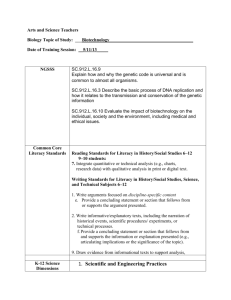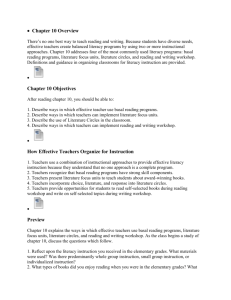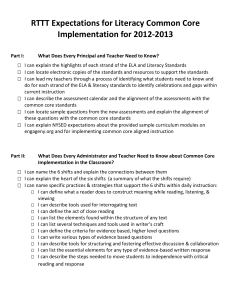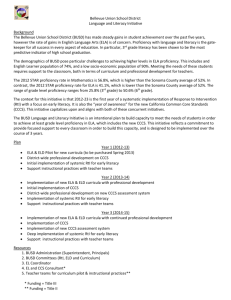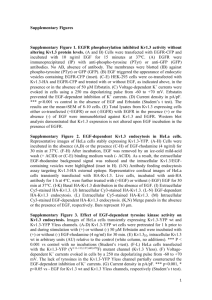Action Plan_4writing
advertisement
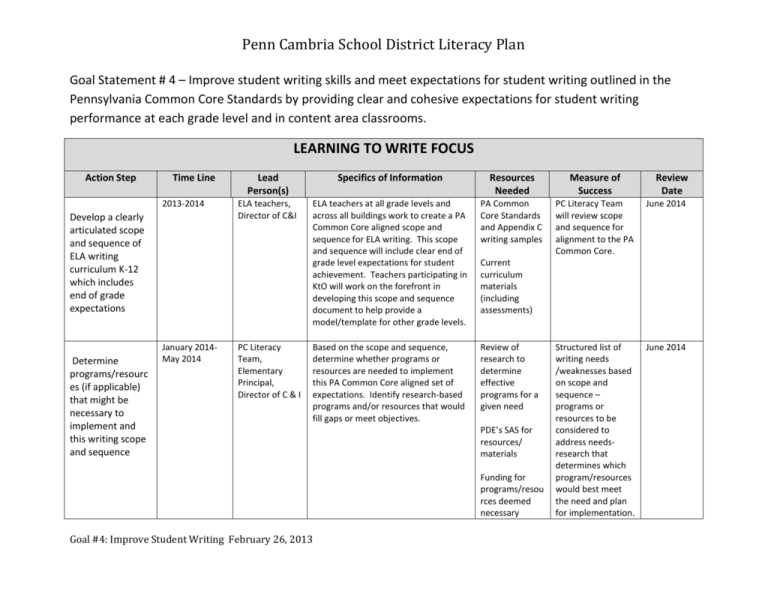
Penn Cambria School District Literacy Plan Goal Statement # 4 – Improve student writing skills and meet expectations for student writing outlined in the Pennsylvania Common Core Standards by providing clear and cohesive expectations for student writing performance at each grade level and in content area classrooms. LEARNING TO WRITE FOCUS Action Step Time Line 2013-2014 Develop a clearly articulated scope and sequence of ELA writing curriculum K-12 which includes end of grade expectations Determine programs/resourc es (if applicable) that might be necessary to implement and this writing scope and sequence January 2014May 2014 Lead Person(s) Specifics of Information Resources Needed Measure of Success ELA teachers, Director of C&I ELA teachers at all grade levels and across all buildings work to create a PA Common Core aligned scope and sequence for ELA writing. This scope and sequence will include clear end of grade level expectations for student achievement. Teachers participating in KtO will work on the forefront in developing this scope and sequence document to help provide a model/template for other grade levels. PA Common Core Standards and Appendix C writing samples PC Literacy Team will review scope and sequence for alignment to the PA Common Core. June 2014 Based on the scope and sequence, determine whether programs or resources are needed to implement this PA Common Core aligned set of expectations. Identify research-based programs and/or resources that would fill gaps or meet objectives. Review of research to determine effective programs for a given need Structured list of writing needs /weaknesses based on scope and sequence – programs or resources to be considered to address needsresearch that determines which program/resources would best meet the need and plan for implementation. June 2014 PC Literacy Team, Elementary Principal, Director of C & I Current curriculum materials (including assessments) PDE’s SAS for resources/ materials Funding for programs/resou rces deemed necessary Goal #4: Improve Student Writing February 26, 2013 Review Date Penn Cambria School District Literacy Plan Provide necessary professional development for ELA teachers as needed to meet expectations of PA Common Core aligned scope and sequence Spring 2014Spring 2015 Director of C&I, PC Literacy team members, instructional coaches Identify professional development needs based on updated scope and sequence. Create a plan for providing quality professional development providing research based instructional strategies and assessment techniques specifically for teaching students writing (with an emphasis on job embedded professional development opportunities). Facilitators for professional development (teacher leaders, Lit Team members, in-house experts in teaching writing, IU 8 Curriculum department, outside presenters) WWC Practice Guides and resources KtO resources Goal #4: Improve Student Writing February 26, 2013 Professional development schedule and teacher feedback from professional development sessions indicating whether session met goals Ongoing through May 2015 Penn Cambria School District Literacy Plan WRITING TO LEARN INITIATIVE Action Step Set common expectations for writing to learn activities for all classrooms grades K-12. Teacher Writing Pre-Survey Time Line Lead Person(s) Specifics of Information March 2013November 2013 Director of C&I, PC Literacy Team, Building Administrators Specifically this refers to writing used as an instructional strategy and/or assessment for content area knowledge and not activities or strategies designed to Ex: ALL HS classes – at least 1 writing to learn opportunity every day Each MS class – at least 1 writing to learn opportunity in at least 3 out of 5 class periods Kindergarten- at least 1 writing to learn opportunity every day Grades 1-2 – at least 2 writing to learn opportunities every day (with an emphasis placed on writing to learn in content areas such as math, science, social studies, etc) Grades 3-4 – at least 3 writing to learn opportunities every day (with an emphasis placed on writing to learn in content areas such as math, science, social studies, etc) Elementary Specials – at least 5 writing to learn opportunities in each specials cycle. None Common expectations clearly articulated in writing reviewed and approved by PC Literacy Team and Educational Leadership Team September 2013 May 2013 Director of C&I Pre-Survey of all teachers to determine current use and comfort of writing to learn strategies within the classroom. Survey Tool (may be combined with survey tool for goal #1) At least 95% survey completion, data analysis by PC Literacy Team June 2013 Goal #4: Improve Student Writing February 26, 2013 Resources Needed Measure of Success Review Date Penn Cambria School District Literacy Plan Writing to Learn Strategies – Professional Development Introduce in small group meetings/team meetings by June 2013 PC Literacy Team – J BlackBuilding Principals Why write to learn? (quick overview) Informal and Formal Writing to learn examples with an emphasis on types 1 and 2 writing – modeling samples, instructional coaching, KtO meetings, other teacher team meetings, providing shared resource site, etc. Ongoing throughout 2013-2014grade level meetings, team meetings, faculty meetings Develop and implement method to support and ensure implementation of writing to learn activities in all classrooms in each building Ongoing Building principals- PC Literacy Team Building principals will support and ensure implementation of writing to learn strategies. Strategy use should be included in lesson plans (highlighted in some manner) Sharing of strategies/student work samples during meetings “Look-fors” during classroom observations and in portfolio reviews Teacher PostSurvey May 2014 Director of C&I Post-Survey of all teachers to determine current use and comfort of writing to learn strategies within the classroom Goal #4: Improve Student Writing February 26, 2013 Writing to learn samples, specific strategy ideas, discipline specific examples, teacher time to create own samples, independent readings Teacher leaders to act as facilitators at meetings Instructional coaching or team meetings for group support, advice and review of student work All teachers are able to identify effective writing to learn strategies and can provide at least 5 samples of writing to learn strategies to use in their classrooms. Ongoing Review of lesson plans shows writing to learn activities occurring as prescribed in 95% of classrooms (documented in observations). Each teacher is able to submit at least five samples of student writing work. January 2014 (end of first semester) and May 2014 Survey Tool (may be combined with post-survey tool for goal #1) At least 80% of teachers selfreporting increased knowledge and comfort level with use of writing as instructional strategy May 2014


